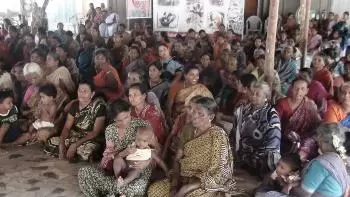‘At Kudankulam, police intent not to uphold rule of law, but to crush dissenting voices’

20-April-2012
Vol 3 | Issue 16
A fact finding team that visited Idinthakarai village, the epicentre of the people’s movement against Kudankulam Nuclear Power Plant (KKNPP), has found the State cracking down on the peaceful agitation with its full might to “teach people a lesson for voicing their concern and challenging the Government.”
The team comprising senior journalist Sam Rajappa, Prof. Gladston Xavier, Advocate Porkodi, and PUCL activists, Mahadevan and Rajan, found that between 10.9.2011 and 23.12.2011, police had filed 107 FIRs against 55795 people and “others,” among whom 6800 have been charged with “sedition” and/ or “waging war against the State.”
 |
|
The agitation against the nuclear plant continues in Kudankulam (Photos: Antony Kebiston Fernando)
|
The team also found that “since all main roads have been blocked, food supplies, milk and water had dwindled as has the reserve of fuel, oil and diesel.”
Shocked by the findings, the team which visited Idinthakarai and other areas in the vicinity of Kudankulam on the 30th and 31st of March 2012, observes that “the frequency and manner in which the Police have filed cases against peaceful protestors clearly exposes that the police's intent never was to uphold the rule of law, but to crush any dissenting voices.”
Following is an Extract from the Report that captures the situation in Idinthakarai village:
On 19 March, 2012, the Tamilnadu Chief Minister (J Jayalalithaa) announced her decision to allow the commencement of work at the Koodankulam Nuclear plant. In anticipation of this decision, the police forces deployed for maintaining law and order during the SankaranKoil bye-election were re-deployed to the areas in and around Koodankulam.
Idinthakarai is a medium-sized fishing village, with a mixed Hindu-Roman Catholic fisher population, and a smaller proportion of other communities. Since August 2011, Idinthakarai has been the epicentre of the protest against the KKNPP.
In the seven months of agitation, members of KKNPP have been subject to numerous provocations, including being pelted with stones, harassed, and having their vehicles damaged.
By and large, the response of the protestors has been non-violent and democratic. Using established satyagraha tactics such as hunger strikes, dharnas and road blockades, they have managed to keep a struggle alive in the face of propagandist campaign by the Central Government and their paid scientists.
The protest site, which was encircled by more than 7000 armed men, including those from Central forces and the Coast Guard, until March 23, was occupied (at the time of writing) by more than 10,000 people of whom 946 were elderly people, and 1500 children, including 715 below the age of five.
Kuthenkuly is another village neighbouring Idinthakarai, which was also under a state of siege by the forces. This village has 553 primary school children, 198 children below age 5, and 462 elderly people.
Idinthakarai is totally dependent on outside sources for drinking water, medical facilities and fuel. Each day, nearly 50 tanker lorry loads of water are purchased at the rate of Rs. 2.50 per pot.
Since the time of the announcement by the Chief Minister, no tanker lorries were permitted to enter Idinthakarai. Since all main roads have been blocked, food supplies, milk and water had dwindled as has the reserve of fuel, oil and diesel.
 |
|
Short supply of food, water and milk has put children to hardship
|
On 20th and 21st March, even the media (NDTV, Headlines Today and Puthiya Thalaimurai) was prevented access to the site, and this access was restored only after concerted public pressure was mounted.
Shopkeepers in nearby villages had been instructed to boycott Idinthakarai and Kuthenkuli villagers, and out of fear of reprisal, many of the shopkeepers were refusing to sell goods to Idinthakarai villagers.
It is learnt that road access to all coastal villages from Tiruchendur to Kuthenkuly had been blocked by the police, and that only coastal access was possible, and even that only to a limited extent.
Women form the bulk of the resistance at Idinthakarai. If the Government of Tamilnadu's intent was to facilitate entry of technical personnel into the plant site, that has been accomplished, and there is no possibility of that being blocked given the overwhelming presence of armed people in the region.
Under these circumstances, the intimidating show of force by the police forces, and the embargo on essential commodities seems to be a means to teach people a lesson for voicing their concern and challenging the Governments.
Even as a Fact Finding Team was being constituted to look into the matter, public pressure resulted in the easing of the situation.
Movement of essential supplies was restored, although movement of people, particularly from the village to the outside world remains problematic as many villagers fear that they will be jailed under false pretexts if they ventured out.
















